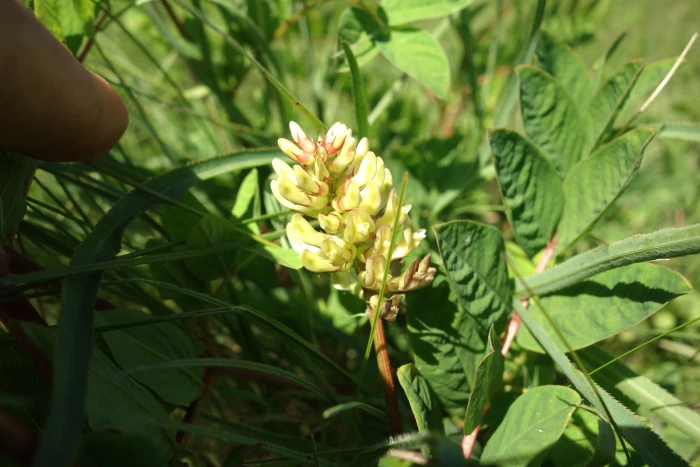Liquorice Milkvetch
/
(Astragalus glycyphyllos)
Liquorice Milkvetch (Astragalus glycyphyllos)
/

Aleksey Baushev
CC BY 4.0
Image By:
Aleksey Baushev
Recorded By:
Copyright:
CC BY 4.0
Copyright Notice:
Photo by: Aleksey Baushev | License Type: CC BY 4.0 | License URL: http://creativecommons.org/licenses/by/4.0/ | Rights Holder: Aleksey Baushev | Publisher: iNaturalist | Date Created: 2021-06-19T15:06:49-07:00 |

























Summary
Astragalus glycyphyllos, commonly known as Liquorice Milkvetch, is a perennial herb that is native to a variety of habitats across Europe to West Siberia, including grasslands, meadows, and open woodlands. It typically grows to a height of 0.5 to 1 meter and spreads to about 0.5 meters wide. The plant has compound pinnate leaves and produces clusters of small, pea-like flowers that are usually yellow, blooming from late spring to early summer. The flowers are modest in appearance but can add a delicate texture to garden settings.
Liquorice Milkvetch is valued for its medicinal properties, particularly its potential use in herbal teas. It is known for its adaptability and can be used in wildflower meadows, naturalistic plantings, or as part of a herb garden. It prefers full sun to partial shade and requires well-drained soil, tolerating a range of soil types from sandy to loamy. It is not particularly demanding in terms of maintenance. This species is not commonly associated with serious diseases or pests, but it can be susceptible to root rot in poorly drained soils. It is also a responsible choice for cultivation in suitable climates.CC BY-SA 4.0
Liquorice Milkvetch is valued for its medicinal properties, particularly its potential use in herbal teas. It is known for its adaptability and can be used in wildflower meadows, naturalistic plantings, or as part of a herb garden. It prefers full sun to partial shade and requires well-drained soil, tolerating a range of soil types from sandy to loamy. It is not particularly demanding in terms of maintenance. This species is not commonly associated with serious diseases or pests, but it can be susceptible to root rot in poorly drained soils. It is also a responsible choice for cultivation in suitable climates.CC BY-SA 4.0
Plant Description
- Plant Type: Herb
- Height: 1.5-3 feet
- Width: 2-3 feet
- Growth Rate: Moderate
- Flower Color: White, Yellow
- Flowering Season: Spring, Summer
- Leaf Retention: Deciduous
Growth Requirements
- Sun: Full Sun, Part Shade
- Drainage: Fast, Medium
Common Uses
Bee Garden, Drought Tolerant, Low Maintenance
Natural Habitat
Native to grasslands, meadows, and open woodlands across Europe
Other Names
Common Names: Wild Liquorice
Scientific Names: Astragalus glycyphyllos, Astragalus gliciphyllos, Astragalus glycophyllos, Astragalus glycyphyllos f. bosniacus, Astragalus glycyphyllos var. rotundifolius, Astragalus glycyphyllus, Astragalus lunatus, Astragalus rotundifolius, Hamosa glyciphylla, Hamosa glycyphyllos
GBIF Accepted Name: Astragalus glycyphyllos
